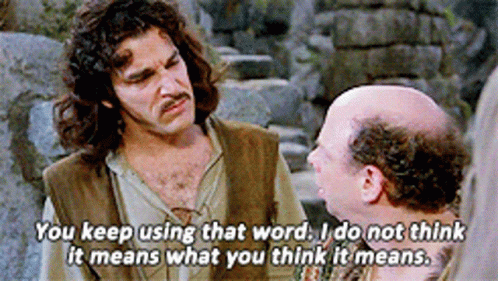Authenticity Means Something Different to Everyone
I feel like Authenticity is the new buzzword experts love to sell as the social media growth hack with little specifics as to what it means.
Princess Bride: “You keep using that word. I do not think it means what you think it means.”
When I first started talking about mental health on Twitch, I quickly got pulled into the idea that my job as an entertainer was to be funny and uplifting to my audience, especially since they were going through a hard time. Chatters would come into the live show perhaps not feeling well, and I felt it was my role to make them feel better.
Over time it became very clear that acting like this was not only hurting me, but was also perpetuating the stigma that people who aren’t feeling well mentally need to be cheered up so that they can feel happy again.
Not only is this a common misunderstanding with advocates in general (I’ve learned my role is to share my story, not to make others feel better, although that may be a byproduct), but it also made me feel awful on days when I couldn’t live up to this false idea. How was I supposed to go live to sell the belief that “it gets better” if that day I didn’t believe it myself?
And that keyword “sell” was the big main problem. If you set out to sell anything on social media: hope, how to get rich and famous, happiness—you’re doing it wrong.
You cannot buy authenticity in any shape. You have to live it, be it, make mistakes, admit them, learn from them, and therein inspire others to find it within themselves. I spent way too much time presenting myself as what I thought people wanted mental health to mean when I should’ve been focusing on learning what mental health meant to me specifically.
Authentic and palatable to everyone are not the same. And I was trying way too hard to make mental health palatable to everyone.
It took me over 2 years before I totally broke down crying live on stream. I wasn’t me. I wasn’t who I wanted to be. How was I going to tell others to accept who they were and how they felt if I wasn’t doing the same?
I didn’t want to tell people everything would be fine all the time as I had learned I actually didn’t believe that. I wanted to normalize that it was ok to vocalize when things are not ok. Not brush my problems under the rug! I didn’t want to be perfect and happy all the time because I couldn’t be and neither can anyone else.
To some, that’s obvious. To me, I had to learn that through a live experience before I could help others understand it. And yet still, acting in such a way for 2 years wasn't inauthentic, it was authentic to what I knew and felt at the time.
For some, authenticity means being raw about their emotions. Which sometimes scares those who aren’t as used to that. Others think authenticity includes mostly showing your best side as a boss, friend, partner—the highlighted moments. That’s who they want to focus on being, and that’s ok too because that’s a real facet of them.
We learn what facet of ourselves we want to show on each social media. And in that way, we learn how to be authentic to that kind of audience.
It is absolutely not the same as learning how to be appealing to your audience, no matter the cost.
People are multifaceted. For example, you may be the kind of person who cusses at home and at work, but would still hesitate to do so in front of your mom. Does that mean you’re inauthentic in front of your mother? Or does it mean that there’s a facet of you, you may not show her always?
The things I share on my dog’s Instagram: his photos with reminders to take care of your pets, the slang I use (momo, doggo) will be totally different than what I share on my private account meant to show off my vacations.
In my opinion, being authentic on social media works in similar ways. You have to figure out where the line is for you. What aspects and facets of yourself you’re comfortable with sharing with folks you may have worked with before, vs strangers on Twitter behind user names. What will you share in an image with a caption on Insta that might just not be interesting on Twitch?
Let’s not forget that authenticity for some is putting up a wall. For some, it’s being your best self, because that’s what you feel you have to be in that moment. For others, it’s being silly. For some, it’s being very serious about human rights and accepting no compromise. That might not be authentic to you, but in that moment, with their passion, that is what’s authentic to them. And that’s wonderful.
Authenticity is an almost arbitrary score society gives you in social media spaces ( ie how well people connect with you on social media), but only you can know what it truly means to you. It’s then a matter of learning to project an authentic self onto the world.

